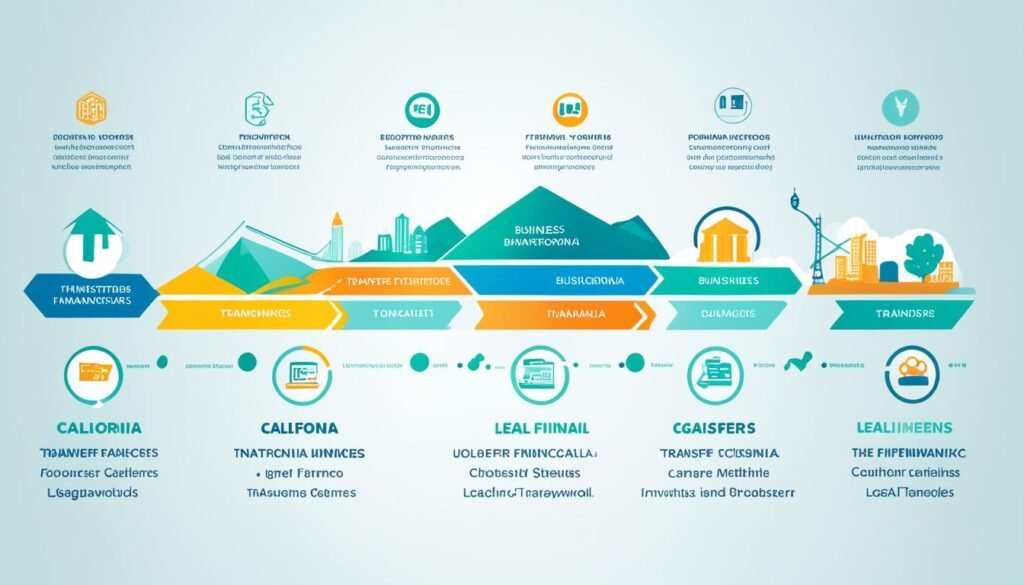In California, selling a business means you could be giving away things like liquor licenses, business names, and equipment1. But first, make sure your company is in good shape1. If you owe taxes, the California Franchise Tax Board might stop you from selling your business or liquor license1. You can check if your business is okay using the California Secretary of State Business Search tool1. If your business is not doing well, you’ll need to fix it before you can sell it1.
Key Takeaways
- Business ownership transfers in California can involve the sale of various assets, including liquor licenses, business names, and equipment.
- Businesses must be in good standing to engage in any business transactions or contracts, such as selling a business.
- Tax debt can impact business transfers, with the California Franchise Tax Board able to take measures to withhold the transfer of assets or liquor licenses.
- Verifying the status of your business using the California Secretary of State Business Search tool is crucial before attempting a transfer.
- If your business is suspended or forfeited, you’ll need to take steps to rectify the situation before any ownership transfer can take place.
Understanding Business Ownership Transfers in California
Transferring business ownership in California is complex. It involves types of business transfers, legal requirements, and tax implications2. Ownership changes can happen through sales, gifts, or legal actions2. County assessors check records to see if a property needs a new value when ownership changes, thanks to Proposition 132.
Types of Business Transfers
In California, business ownership can change in many ways. This includes selling a sole proprietorship, transferring LLC shares, or selling the whole business3. LLCs use agreements to outline who owns what and how to transfer shares3.
Legal and Tax Implications
When changing ownership, you must think about legal requirements and tax implications2. Taxes depend on the property’s current value versus its value in the base year set by Proposition 132. Some rules can stop reassessment, keeping the old base year value23. Changing LLC ownership means updating records, telling others, and dealing with possible disputes or taxes34.
| Key Considerations | Details |
|---|---|
| Types of Business Transfers |
|
| Legal Requirements |
|
| Tax Implications |
|

Understanding types of business transfers, legal requirements, and tax implications in California is key234. Getting advice from experts can help make the transition smoother.
Transferring Sole Proprietorship Assets
When you’re moving a sole proprietorship in California, you’re not selling the business itself. Instead, you’re moving its assets. You need to list all the assets and value them right to get a fair price5.
You also need to think about contracts like leases or supplier deals. You might need to get okay from others or change the contract terms5.
The business’s goodwill, its good name, customer ties, and community respect, adds a lot to the deal. A well-made sales agreement helps make the switch smooth and keeps everyone’s interests safe5.
Asset Inventory and Valuation
First, make a detailed list of what the business owns. This includes things you can touch like equipment and inventory, and things you can’t like patents and customer deals56.
After listing the assets, figure out what each one is worth. You might need experts, research, or talks with the other side. Getting the value right is key for a fair deal6.
Contractual Obligations and Goodwill
Don’t forget about contracts the business has. This could be leases, supplier deals, or customer agreements. Make sure these are moved over or changed right to keep the business running smoothly5.
The goodwill of the business, its good name and customer connections, is also important. Figuring out its value and adding it to the sale makes sure everyone gets a fair deal5.

“Transferring a sole proprietorship’s assets requires careful planning and attention to detail to ensure a successful transition.”
Transferring LLC Ownership Interests
Transferring ownership in a California LLC is more complex than in a sole proprietorship. Unlike corporations, where ownership can be easily bought and sold, LLC members need all others to agree to transfer their shares7. The LLC’s operating agreement is key in outlining how to transfer ownership. If it doesn’t, California law sets default rules7.
Role of the Operating Agreement
The operating agreement sets the rules for an LLC, including how to transfer ownership. It should detail adding new members, removing old ones, and selling shares7. It might include rules for pre-emptive rights, buy-sell agreements, and more to control ownership changes8.
Without specific rules in the operating agreement, California’s default laws apply. These laws cover getting consent from members, valuing shares, and transferring ownership7. Getting legal advice is wise to navigate ownership transfers and follow the law8.
| Service Provider | Pricing |
|---|---|
| ZenBusiness | $0 + State Fees |
| LegalZoom | $99 + State Fees |
| Northwest Registered Agent | $39 + State Fees |
| Formations | $0 + State Fees |
LLC services in California have different prices, from $0 + State Fees to $39 + State Fees8. Businesses might use legal pros like Incorporation Attorney for help with ownership changes. They offer custom solutions for documents and following the law8.
In summary, transferring ownership in a California LLC needs careful thought on the operating agreement and state laws. Knowing the operating agreement’s role and getting expert advice ensures a smooth transfer78.
Selling the Entire Business
As a California business owner, you might decide to sell the whole company to someone else. This can mean selling the business itself or just its assets. All LLC members must agree to the sale, and the process should be well-documented. This ensures a smooth transition and protects everyone’s interests9.
When selling a California business, buyers need a list of all businesses and addresses the seller used in the last three years. They must file the Bulk Sales Notice with the county recorder at least twelve days before the sale10. Not following California’s Bulk Sale Law can make the buyer pay for what the seller owed but didn’t pay10.
A merger or acquisition can be a good way to transfer ownership, especially if clients need ongoing services9. Or, a lease option lets the lessee run the business and buy it later9.
Transferring an LLC’s ownership is like a partnership. You need a new operating agreement and to file paperwork with the state9. In corporations, shareholders can buy and sell shares, but taxes are important to think about9. The type of transfer affects the financial, legal, and operational details9.
For a smooth and legal sale of a California business, it’s key to work with lawyers who know about business sales10. A detailed Bulk Sale Agreement is vital to protect everyone’s interests10.
Partial Ownership Transfers and Buyouts
Transferring business ownership in California doesn’t always mean selling the whole company. Sometimes, owners might want to sell just a part of it. This is done through a partial transfer or buyout11. These deals are often set out in a buy-sell agreement, which details the rules of the transfer11.
For LLCs, the operating agreement should spell out how to handle these partial transfers11. If it doesn’t, California’s laws will step in11. These transfers and buyouts can happen for many reasons, like retirement, personal changes, or merging with another company11.
Buy-Sell Agreements
Buy-sell agreements are key for smooth partial ownership transfers and buyouts in California businesses11. They set the rules for buying or selling ownership, making sure the change is smooth11. These agreements should cover things like how to value the business, financing, and the rights and duties of everyone involved11.
Setting up buy-sell agreements the right way can prevent disputes, ensure fair payment, and keep the business going11. Whether it’s to pass on ownership to family, employees, or outsiders, having a solid buy-sell agreement is vital for California businesses11.
Transferring business ownership California: Complexities to Consider
Transferring business ownership in California comes with many challenges. Owners face issues like the death of an LLC member and deciding to dissolve and reform the LLC. These problems need careful planning and action.
Death of an LLC Member
When an LLC member dies, their share usually goes to their spouse or kids12. This can change the ownership mix and might mean buying out the dead member’s share to keep things running smoothly12. It’s important to understand the legal and tax effects of this change to keep the business doing well.
Dissolution and Formation of a New LLC
In some cases, it’s best to close the LLC and start a new one12. This choice needs a close look at the operating agreement and knowing California’s LLC laws12. Think about how it will affect the business, its workers, and its customers.
Getting advice from a lawyer who knows California business law is very helpful12. They can guide you through the legal and financial details, making sure the change goes smoothly and the business’s legacy is protected12.
| Complexity | Considerations |
|---|---|
| Death of an LLC Member |
|
| Dissolution and Formation of a New LLC |
|
By tackling these issues early and getting expert advice, California business owners can make sure the ownership change goes smoothly. This protects the future of their business12.
“Proper planning and preparation are key to navigating the complexities of transferring business ownership in California. Engaging with an experienced attorney can provide invaluable support in protecting the business’s legacy and securing its long-term success.”
Notifying California Authorities and the IRS
When you change the ownership of a business in California, you usually don’t have to tell the state or the IRS. This is unless the change affects the LLC’s taxes or if the business is closing down13. But, if the new owner changes how the business is run, you must update the LLC’s articles with the California Secretary of State14.
The IRS doesn’t need to know about simple changes in ownership. But, some tax forms might be needed based on the details of the change13. For instance, if you’re the only owner, you must pay taxes on time throughout the year. These payments are due on April 15, June 15, September 15, and January 15 of the next year13. Also, a 7 percent backup withholding is needed for non-California residents who work in California13.
If you have a general partnership, make sure to record the ownership change well. General partners are fully responsible for all debts and legal issues of the partnership13.
Notifying the authorities might seem easy, but knowing what you need to do is key. This ensures a smooth change in business ownership in California14.
Conclusion
Transferring business ownership in California needs careful planning. You must look at legal, tax, and practical aspects. It’s key for California business owners to know the different ways to transfer ownership. This includes selling a sole proprietorship, transferring LLC interests, or selling the whole business15.
Getting help from lawyers and financial advisors is crucial for a smooth transfer15. Reviewing your agreements, thinking about taxes, and telling important people can make the process easier15.
With more businesses for sale in California, selling might be a good choice for some owners16. But, remember the tax costs, like the capital gains tax, which can be up to 37%16.
FAQ
What are the key steps involved in transferring business ownership in California?
How does the transfer of a sole proprietorship differ from transferring an LLC in California?
What are the legal and tax implications of selling an entire California business?
How do buy-sell agreements work in partial ownership transfers or buyouts of a California business?
What additional complexities should California business owners consider when transferring ownership?
Do I need to notify the state or the IRS when transferring business ownership in California?
Source Links
- https://www.ftb.ca.gov/help/business/business-transfers.html
- https://www.boe.ca.gov/proptaxes/faqs/changeinownership.htm
- https://www.doola.com/blog/transfer-ownership-of-llc/
- https://www.connect2capital.com/small-business-lending-blog/transfer-business-to-another-person/
- https://www.marketwatch.com/guides/business/change-sole-proprietorship-to-llc/
- https://www.score.org/resource/blog-post/how-transfer-assets-your-llc
- https://www.incorporationattorney.com/forming-llc-company-incorporation-california/change-transfer-ownership/
- https://www.forbes.com/advisor/business/how-transfer-llc-ownership/
- https://www.lendio.com/blog/how-to-transfer-business-ownership/
- https://www.midmarketbusinesses.com/about/deal-team/bulk-sale-notice
- https://www.unitedcapitalsource.com/blog/transfer-business-ownership/
- https://kevensteinberglaw.com/business-succession-planning-in-california-a-legal-perspective/
- https://www.ftb.ca.gov/forms/misc/1123.html
- https://www.sos.ca.gov/business-programs/business-entities/faqs
- https://www.forafinancial.com/blog/small-business/transfer-business-ownership/
- https://bizee.com/blog/how-to-transfer-llc-ownership

